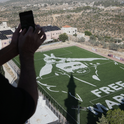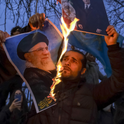Turkey's election of 22nd July was meant to be about secularism, the creed that the republic's founder, Kemal Atatürk, adopted in the 1920s, and which the ruling AK party (AKP) of Recep Tayyip Erdogan had been accused of subverting. It was to defend secularism that Turkey's generals in May made known their displeasure at plans to raise the pious, affable Abdullah Gül to the presidency, and it was to resolve the stand-off that Erdogan sought a new mandate—a mandate that he has now said he will use to put Gül in the presidential palace.
With its fine economic record, the AKP was never going to lose; to assure itself of a working majority, however, it needed to shed its divisive Islamist colouring and become a party for all Turks. In Turkey's southeast, those mainly Kurdish provinces that have been the epicentre of a vicious rebellion since 1984, the AKP set itself a harder challenge: to become a party for all Kurds.
One of Erdogan's achievements is, indeed, to have made the AKP acceptable to many Kurds—the first mainstream party to achieve this distinction in 40 years. It does no harm that the AKP is full of devout Muslims and that many Kurds are also devout, or that the government has restrained the army from attacking guerrillas from the Kurdistan Workers' party (PKK) in their camps in northern Iraq. But the main explanation is that in Erdogan, Turkey finally has a prime minister who recognises the Kurdish problem for what it is: a problem of ethnic identity rather than economic and social backwardness. The government has partially implemented Kurdish demands for linguistic and cultural autonomy, and reduced torture in police stations.
The Kemalist establishment deplores Erdogan's attitude. In the good old days, the standard approach to the problem was to pummel the PKK inside Turkey and northern Iraq. Since the US-led invasion of Iraq, however, the Turks have been unable to enter northern Iraq at will. At home, the Kurds have since 2002 enjoyed more liberty of expression than at any time since the republic's inception. Turkey has recognised the right of supporters of Abdullah Öcalan, the PKK's incarcerated leader, to set up political parties and, if elected, enter parliament, although Kurdish nationalist parties have been blocked by a law denying representation to parties with less than 10 per cent of the vote. Before the 2007 election, the latest pro-Öcalan party, the Democratic Society party (DTP), decided to put forward its candidates as independents.

Varto is a beautiful, mountainous district with fewer than 19,000 registered voters—most Vartolus live elsewhere, scattered by poverty and war. It has produced hundreds of guerrillas, but has also long been divided along sectarian lines. During the slaughter of Armenians in the first world war, the Ottoman authorities brutally expelled the Armenians of Varto. Since then, the district has been dominated by Sunni Kurds and the Alevis, a sect of heterodox Muslims who were persecuted under the Ottomans and subsequently embraced Atatürk's secularism.
In the 1970s, radical Kurdish groups began attracting some Alevis. So it was that in 2004, an Alevi—the taciturn, bookish Demir Çelik—was elected to be Varto's first Kurdish nationalist mayor. Çelik defeated the incumbent, a prominent local Sunni and AKP man, Abdulbari Han. When I arrived in Varto, I realised that the battle here was between Çelik and Han as much as it was about national politics. The government would not defeat the independents in Varto, but it might, using patronage and Han's connections among local Sunni tribes, trim the Kurdish nationalists' share of the vote from the 2002 figure of 63 per cent.
Abdulbari Han's grandfather joined a rebellion against Atatürk in 1925. His cousin was one of the first Vartolus to fall while fighting for the PKK. Naturally, he rejects charges that Kurds who vote for the AKP are traitors. "Every family has its martyr," he told me. He reeled off a list of services that he said the government has brought to Varto: piped water to the villages; free healthcare; better roads.
Across the Kurdish area, the choice is the same: between the government and its (modest) services, and "the party"—the DTP—with its jailed icon "Apo" (as Öcalan is called) and its patriotic honour. Honour still counts for much, I learned while touring the district in the DTP bus. The men laid down their scythes and gave the victory symbol as we passed. In the villages, the women and children danced to a Kurdish jingle while the men covered Demir Çelik with kisses.
The following day, Sirri Sakik, a DTP-sponsored independent, came to town. Polished and superior, he spoke to me of the independents' desire to avoid confrontation. Things have changed since 1994, when several pro-Öcalan deputies were expelled from parliament: "the Turkish establishment has accepted the Kurdish reality." Without armed struggle, PKK supporters say, this acceptance would not have come, and they are probably right, though the cost in lives (37,000 so far) has been vast. The past five years of reduced violence, I suggested, had seen the most progress; surely this was down to the AKP? Sakik shook his head. "The AKP doesn't say anything about a solution." The DTP's favoured solution includes an amnesty for jailed militants (notably Öcalan), Kurdish-language education and talks on regional autonomy.
Up on the dais, Sakik and the other speakers urged the Kurds not to barter their votes for the AKP's puny rewards. Behind me, the steps of Varto's main commercial building were crowded with headscarved Sunni village women, some with babies, chortling among themselves. There seemed to be fewer Alevis.
The next day the numbers at the rival AKP rally were smaller, and to judge from the convoy leaving Varto after the event, many who did turn up were from elsewhere. A sitting AKP deputy attacked the independents' obsession with the Kurdish issue. He promised stability and progress, not Kurdish jingles.
Early on polling day, I was picked up by two policemen and we toured some schools where people were voting. There was a curious atmosphere of bonhomie and mutual distrust between these policemen and the voters. Later in the morning, I got a call from a local journalist telling me that Kurdish nationalist voters had been intimidated in Sazlica, a PKK-friendly village. When I arrived, the space in front of the village school was teeming with troops. Upon learning that I was a foreign journalist, the soldiers drove off.
Escorted by a Sazlica man, I entered the polling station. A sullen election official—an outsider, I was told, no friend of the Kurdish cause—had been spotted guiding illiterate voters so that they voted, against their will, for mainstream parties. (The official denied this.) There had been an altercation, during which the official had fallen to the floor. Dozens of soldiers had arrived, and the official's alleged assailants were arrested. My escort insisted that no punches had been thrown: "The election official hurled himself on the floor! We want the European court of human rights to know about this."
At dusk, I went to the DTP headquarters in Varto town. It was crammed with excited people. The DTP district chief began announcing results from the villages. "The results from Dadina! Sirri Sakik: 260! AKP: 10!" There was a cheer. "The results from Kaynarca! Sirri Sakik: 387! AKP: 17!" A louder cheer. He carried on in this vein, and it became clear that the province would return two Kurdish nationalist deputies and two AKP. There was a call for the blind bard Selahattin to take the microphone. Selahattin got to his feet, beaming and milky-eyed, and sang a panegyric to Öcalan. The room resounded with, "Long live our leader Apo!"
But as the evening wore on, I realised that the DTP man had announced the results from the nationalist villages first. As the results from the Alevi villages came in, and those villages allied to Abdulbari Han, it became clear that the Kurdish nationalist share of the vote in Varto had dipped—to 54 per cent. Furthermore, the number of AKP votes had risen substantially, from a mere 336 in 2002 to 1,967.
Nationally, the AKP had won by a landslide, winning 47 per cent of the vote—a 12-point increase on its share in 2002—and scoring stunningly well in several Kurdish provinces. The Kurdish nationalists mustered a disappointing 21 seats out of 550 in the parliament. The pleasure of sending Kurdish nationalists back to Ankara was soured, and not only by the election of 71 members of a Turkish nationalist party. In his triumphant re-election, Erdogan underscored the challenge he and his presidential nominee represent, not only to Turkey's establishment, but also to the Kurdish nationalists' claim to be the sole representative of Turkey's Kurds. If I were Öcalan, on my prison island, I would be worried.
Discuss this article at First Drafts, Prospect's blog










